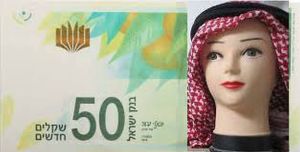After June, only banks will be allowed to hold Israeli currency, which they will be forced to surrender in exchange for underage brides by the first of August.
 Ramallah, March 2 – Palestinian Authority President Mahmoud Abbas announced today that his government would soon expand its economic boycott of Israeli products and services to include barring the use of the shekel, Israel’s currency.
Ramallah, March 2 – Palestinian Authority President Mahmoud Abbas announced today that his government would soon expand its economic boycott of Israeli products and services to include barring the use of the shekel, Israel’s currency.
The shekel has served as the currency of choice in the Palestinian territories even after the Oslo self-rule agreements of 1993 and the Authority’s use of “State of Palestine” on its official documents as of last year. That very symbol of dependence and intertwined economies has now become the target of an anti-“normalization” movement among Palestinians who eschew any activity involving Israel, Israelis, or Israeli products lest such interactions imply acceptance of Israeli occupation.
Lacking a central bank of their own, and with no hope of establishing credit in international circles, the move away from the shekel necessitates either the adoption of an alternative existing currency or the implementation of some kind of sweeping alternative to currency itself, since anything minted or printed as actual Palestinian currency would be functionally worthless. Unwilling to trade dependence on Israeli currency for dependence on that of a third country, Abbas decided to mandate a barter-based economy, which will eliminate the use of such reminders of dependence and lack of sovereignty.
Palestinian economic officials began scrambling this morning to establish a centralized system for monitoring and regulating the accepted exchange rates for goods and services. The deadline for surrendering Israeli banknotes and coinage has been set at 31 March, but a spokesman for Abbas acknowledged that full implementation of the barter system, not to mention exchange of all the shekels in Palestinian circulation, is likely to require more than four weeks.
“Such an innovative solution to economic challenges is not going to be without its difficulties and setbacks, given the unprecedented nature of such a system,” said Ayma Ful, Second Deputy Assistant Undersecretary for the Reduction of Bureaucracy, Northwest Ramallah Division. He noted that in reality a full-scale rollout of barter and removal of shekels from circulation would more likely require several months rather than just over four weeks, and that there would be a grace period between the end of March and the beginning of July, during which both forms of payment would be accepted, and exchanges for various goods would be available at banks. After that point, however, only banks would be allowed to hold Israeli currency, which they will be forced to surrender in exchange for underage brides by the first of August.
An additional benefit of implementing a barter system would be the removal of counterfeit Israeli currency from the economy, says finance expert O. Sterrity. “In fact the main counterfeiters of shekels are Palestinians loyal to Hamas, so this is just as much a blow against Abbas’s rivals as it is against Israel – and Israel stands to benefit from a reduction in counterfeiting.”
Sterrity noted, however, that it remains premature to forecast the end of Palestinian counterfeiting efforts, since they have proved masters of the craft far beyond currency, managing to convince the world of their unvarnished victimhood for nearly seven decades already.




